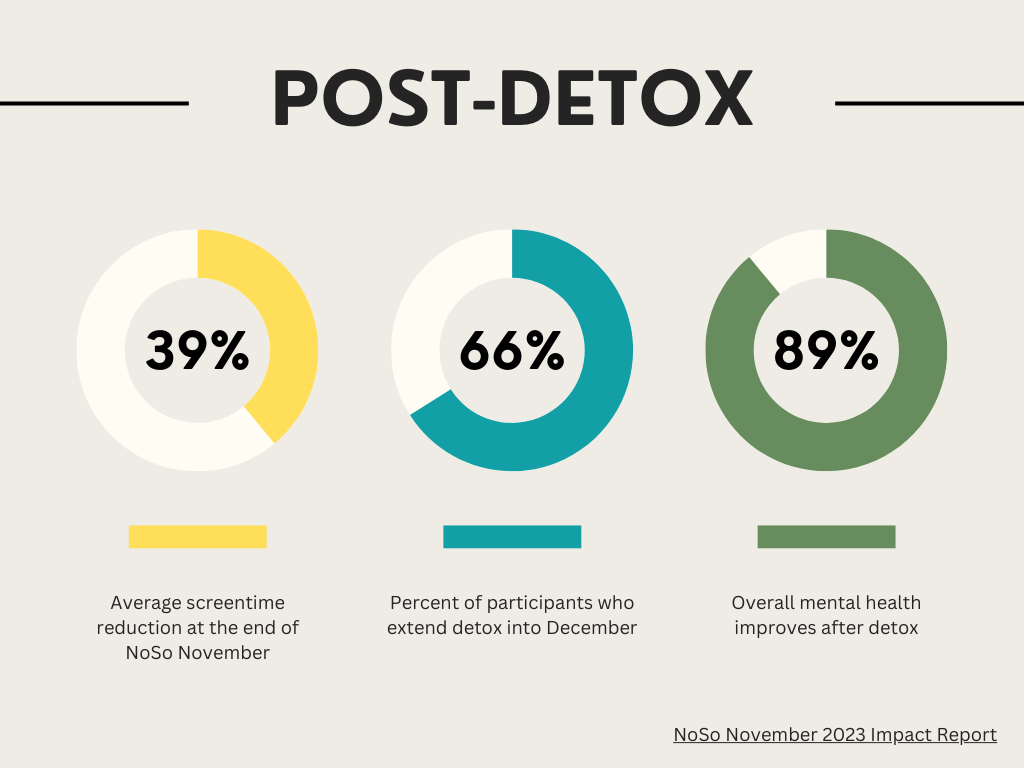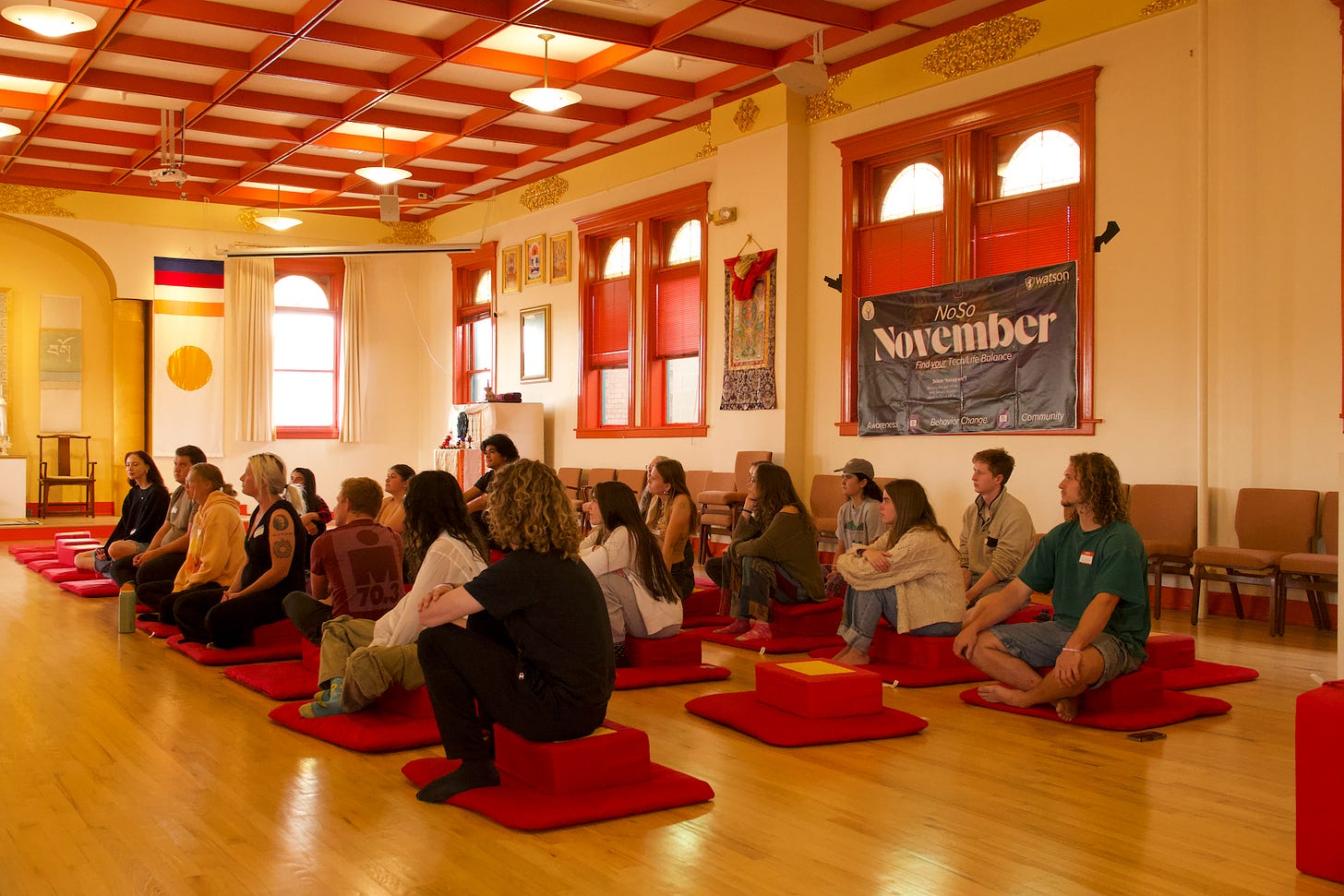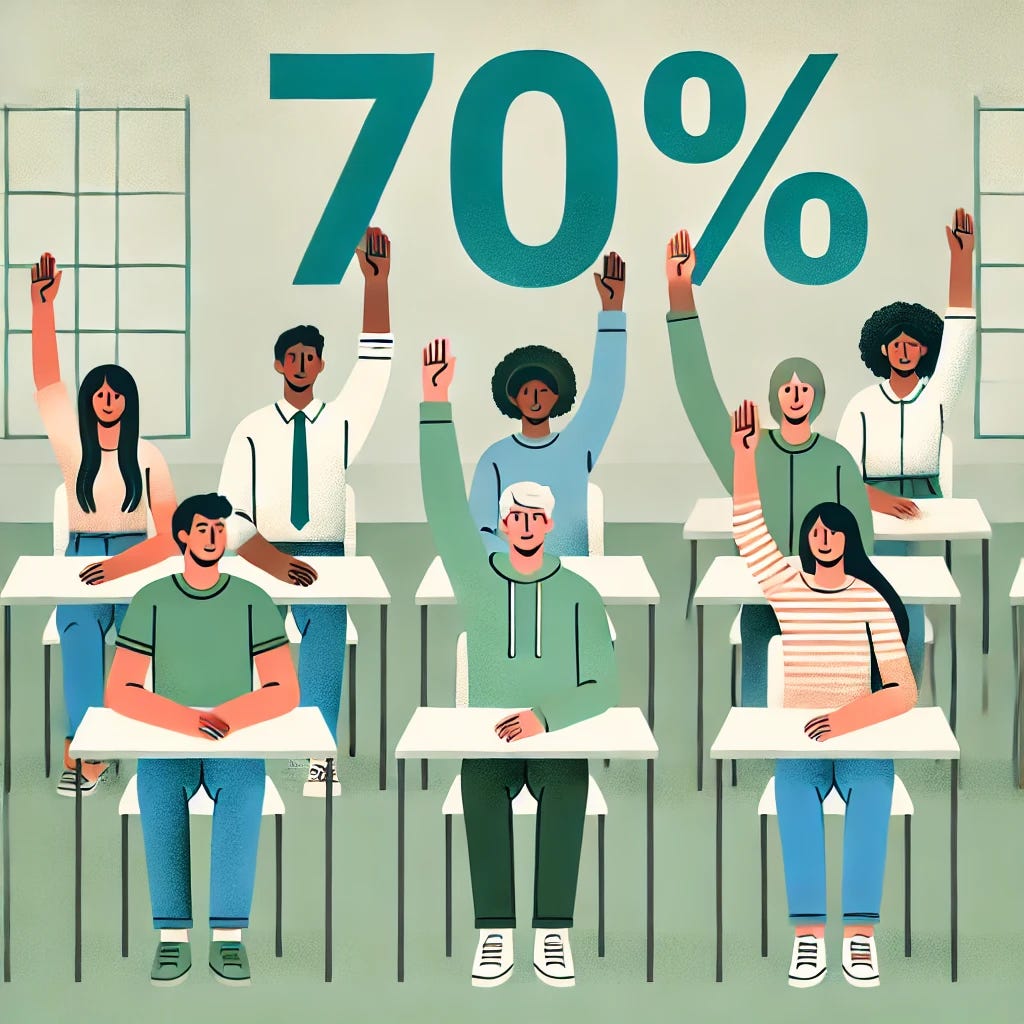The Digital Detox Movement Turning Gen Z Off Social Media
No Social Media November Expands Worldwide
Young people are often perceived as the most attached to their phones and social media. While there’s truth to this, many in Gen Z are also the most aware of what their generation loses because of these platforms.
No Social Media (NoSo) November is a free digital detox movement that emerged from this understanding. Its founder, Maddie Freeman, was inspired after losing 12 peers to suicide in high school. The connection between social media use and depression weighed on her. After watching The Social Dilemma, she launched NoSo, which includes a month-long group digital detox each November, a hands-on educational program, and mindfulness based events to support participants in being offline.
What makes NoSo unique is how it turns what could be an isolating experience into a community effort. The program offers three tiers of participation, so you don’t have to quit cold turkey if that feels overwhelming. NoSo also works with schools on tailored programs.
I first interviewed Freeman in 2021, during NoSo’s second year. Since then, I’ve watched its reach grow. Freeman says that the demand is stronger than ever. What began as a “tiny passion project” in a Colorado high school has grown to reach over 10,000 students and schools across the U.S., with plans to expand to Switzerland, Canada, Spain, Malaysia, and beyond. Now, with a full-time team of four and three interns, Freeman is planning to make NoSo a year-round option. And she will be on a panel at South by Southwest this March.
The results are pretty astounding. In 2023, participants’ screen time declined by nearly 40%, from eight to five hours a day on average. Nearly 90% said their mental health improved, and 66% extended the detox into December.
Freeman has even teamed up with The Social Dilemma’s director, Jeff Orlowski, to promote NoSo in 2022 and Anxious Generation author Jonathan Haidt boosted a video NoSo created the following year.
I wonder if NoSo November is part of a broader cultural shift that’s happening right now—a movement where social media’s influence is weakened by behavior choices as much as regulation, as more people actively choose to log off.
I spoke with Freeman on Election Day, an apt moment to discuss the benefits of going offline for mental health. With the fate of national regulation of social media uncertain in the wake of the election, NoSo November may signal a broader cultural shift—one where individual decisions to log off or significantly reduce time on social media begin to weaken its influence, even before legislation steps in. This week, I've seen a surge of content emphasizing the importance of preserving mental health and sanity during such challenging times, and I don’t think that focus is fading. I think people, myself included, are eager to find ways to stay connected without feeling overwhelmed.
Freeman’s journey and the growth of NoSo November offer a glimpse into a future where digital wellness is part of everyday mental health discussions. Whatever is in store for social media, NoSo reminds us that we have the power to collectively reduce its grip on our lives.
Here are some excerpts from our interview, edited for length.
How are things going with the fifth year of NoSo November?
Maddie Freeman: We're really growing, and it's so exciting, because there was a while where I felt like I had to convince schools that this was important, and convince them that digital wellness was a part of mental health, and now I don't even have to really promote it. Schools come to us and they say, ‘We want to do this.’
When I first went into schools in 2020, I had just watched The Social Dilemma for the first time, and that was my inspiration for creating this in the first place. [Before that] people weren't really concerned with digital wellness, they weren't really like talking about it that much to the extent they are now and then. Another benchmark that created ripples was Francis Haugen, [the Facebook/Meta] whistleblower.
[Before that] I literally felt like I had to tiptoe around saying, ‘mental health and social media are related.’ I only could talk about correlation, not causation. I had to convince schools, ‘Hey, I've seen the impacts. It definitely is bad for mental health, but, there's not that much research out yet.’ And now there's this whole crazy surge, with Anxious Generation by Jonathan Haidt.
There was a while where I felt like I had to convince schools that this was important, and convince them that digital wellness was a part of mental health.
Schools I think are coming to terms with, ‘Okay, this is really bad for student productivity. This is bad for student mental health. This is bad for their social life.’
Do you recommend people spend the whole month away from the apps? Or is it more customized to what people can do, or what schools want to do?
Both with the detox and the school program, flexibility and customization are the name of the game. We always encourage if possible, the “all in” approach as the best possible way to learn the most about yourself, to deepen that self awareness, to escape that kind of dopamine-driven distraction habit that people have with social media. And that's, delete all your social media for the full month of November, including anything that feels addictive to you.
We know that not everyone wants to do that, can do that, or maybe it feels too daunting for them, so we have the other two options. So the second option is the school and work approach. Say you manage your business's Instagram account, you can delete all your other social media and still have that one social media, so that you can still continue doing your work, but you just try to limit, scrolling or mindless consumption on that one app.
And then the other option is just working on it. So that option is kind of two pronged. You can either do a shorter detox. Or you can also do, just use our habits and our tips and tricks to make your digital realm a little bit healthier and a little bit less appealing to your brain. So in that way, you don't even have to take a detox. The whole goal of our programming is, how do you find a healthy tech-life balance.
Do students welcome this? Do they want do it?
When I get up there, I can tell that the vibe shifts. Initially, kids are too cool. They don't want to listen to anything. But as soon as I get up there, I'm just talking to them like people, like equals, and [say] I was just in your shoes, I'm not that much older than you. I've talked to many different demographics, to many ages. It's always nerve wracking. But without fail, like 70% of the class raises their hands [to do] the detox every single time. And we've heard just like, immaculate feedback. I've worked with some schools for five years straight, and they tell me that, it has lasting impacts throughout the whole year.
Kids today, they're very hyper aware that social media is negatively impacting them. Almost all of them have an overall very negative view. Another activity I like to do is go around the room and say, ‘use one word to describe your relationship to social media.’ I've never heard a positive word ever. It's always negative. And that is very telling to me. But there's this collective action issue, where kids feel like, I don't like it, but everyone's on it, and my social life depends on it, so I can't get off it. But that's what we try to solve, is, if everyone can take that jump together, it can change everyone's life, because then they all realize they're not reliant on it.
By the time, the second, third week rolls around, people are like, “I do not want to go back to social media. I feel so good. I feel so much better without it.”
What are typical journeys for people, at the start, middle, and end?
There are withdrawal symptoms the first week. Like, I'm struggling right now with YouTube. At night, I just so badly want to distract myself and just, watch YouTube videos to relax, and I'm having to turn to other things. It's been five days. I feel way better today than I did three days ago. I had 10 different people text me. They're like, “Dude, I keep clicking where Instagram used to be.” It's an automatic, physical habit where your brain doesn't even think about what it's doing and it just it wants it.
At the same time, people will say, “Dude, I just had lunch with my roommate, we haven't talked in like weeks.” I have a lot of people who are like, “I've been texting my friends way more, and I feel way more connected to them.”
Then around a week [in], we see participants starting to not have those symptoms, and they start rerouting to healthy habits. “I'm going to go on a walk instead of watch Tiktok. I'm going to journal instead of watch YouTube.”
By the time, the second, third week rolls around, people are like, “I do not want to go back to social media. I feel so good. I feel so much better without it.” They've invested time in themselves. They have free time. One participant started a yoga challenge and a meditation challenge during the detox, and then he ended up getting a yoga certification and becoming a yoga teacher, and then started a meditation club at his college, and won an award for it.
Literally, just removing one thing from your life can bring so much abundance to you and so many people. I think above 70% of participants do the detox every year. Almost every person that has done our detox the first two years are still doing it.
That one phone call means so much more than 50 Snapchat streaks.
When you mentioned roommates having lunch together who hadn't for awhile — I read something recently about how social media can replace real life social interactions. Do people find that through this experience?
I think what's interesting is a lot of times folks are 50/50, on if they think their social life will suffer or not. Social media feels very social, and [we have people concerned during the detox that] they can't be connected to their friends and family if they're not on. But I think what we see is, social life improves. And so last year, with our detox survey, 83.3% said the detox itself overall improved their social life.
What [participants] find is, we have so many surface level relationships online, but the depth of relationships is so much more supportive for us [offline]. That one phone call means so much more than 50 Snapchat streaks. People continually are reflecting on that depth, that “it matters so much more that I'm deeply connected to, six people — you know, it's quality over quantity — rather than, like, 1.000 followers that they have that they think are friends, but in reality, they don't actually care about each other at all. Right?
With NoSo, one of our pillars is community. We want people to make this the most social experience, and we always encourage people to, get their friends, get their family, do the detox together, do it with a group. Do challenges. I'm doing a meditation challenge with two of my friends. We have a group chat. We send a check-in in the group chat every day to tell each other that we meditated. Have people hold you accountable, do it together, struggle together, talk on the phone about it.
Realizing, ‘wow, I actually am more socially connected when I'm not on social media.’ It's kind of a crazy paradox that I don't think people realize until they do it.
That thought process that social media is a key mechanism for socializing is exactly what the developers of the apps want you to think. Because they want you to think ‘my life is meaningless and I have no social connection and no one cares about me unless I'm on social media.’ They understand we're social creatures, and we need social connection to be happy and to thrive and to function. That innate need to feel loved and connected is tapped into directly with social media. Being able to say, I'm going to take this month off, even if it does hurt my social life, I'm going to see what it's like. And then realizing, ‘wow, I actually am more socially connected when I'm not on social media.’ It's kind of a crazy paradox that I don't think people realize until they do it.
The tides are changing with young people. People are becoming more willing to change their own habits for their best interest. It's becoming more and more common for our age group to reject the idea that you have to be on this platform.
What does the future look like to you? Do you see a future where fewer people are on social media, or where more people do a detox one month, or a future, where, say, Meta, changes how they do business?
The Senate with bipartisan support passed a bill to regulate platforms for kids under the age of 18, to make restrictions around addictive design, content, and the kinds of people who can contact them. [Learn more about the Kids Online Safety Act and the Children and Teens Online Privacy Protection Act, which the House may vote on in the next few weeks. Otherwise, it faces an uncertain future with the new administration].
Unfortunately, there is no way these companies will regulate themselves. They have had time and time again so many opportunities. They are the most profitable companies on Earth right now. But I would say I do have faith, kind of, in the regulatory system, and I have faith in creative destruction, innovation.
The third thing I really do have hope in is the tides are changing with young people. People are becoming more willing to change their habits for their best interest, and at the end of the day, these platforms are fully reliant on the public’s use of them. It's becoming more and more common for our age group to reject the idea that you have to be on this platform. I guess we shall see. But in the meantime, there’s so many incredible people doing work at every angle, and I think we’re moving in the right direction.
You can still get involved in NoSo November. It’s going on this month, and it will soon expand to year-round offerings.









Great update ~ so glad NOSO is still going strong!